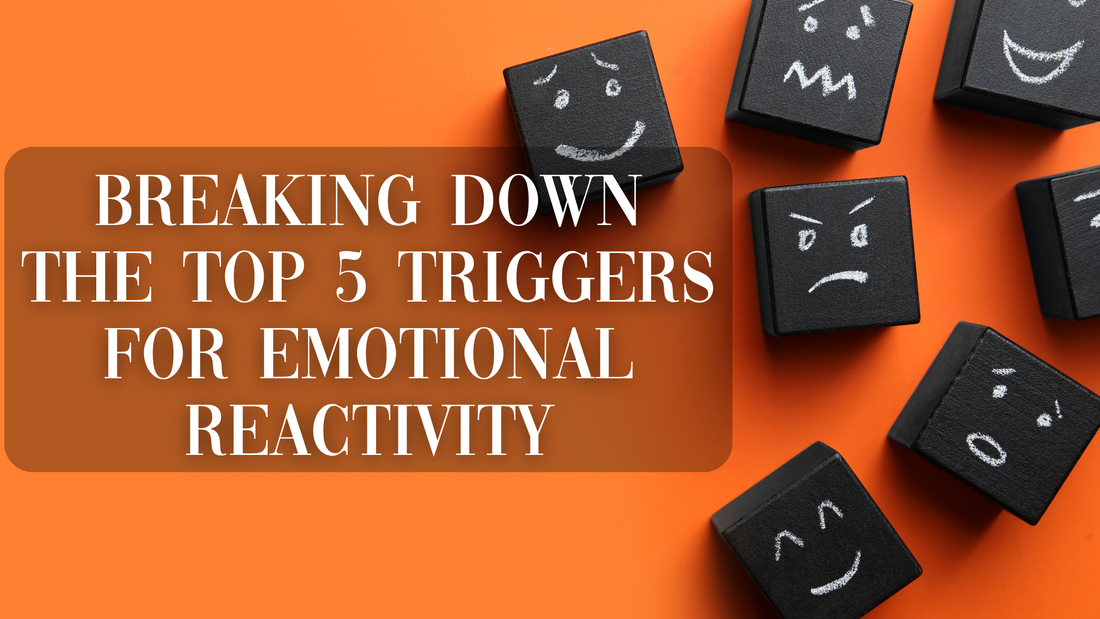
Breaking Down the Top 5 Triggers for Emotional Reactivity
Marc BarthelemyShare
Emotional reactivity is a common phenomenon that can impact our daily lives. Understanding the triggers behind emotional reactivity is crucial for managing our emotions effectively. Let's break down the top 5 triggers that can lead to emotional reactivity and explore strategies to address them.
1. Stress
Stress is a major trigger for emotional reactivity. When we are under stress, our bodies release cortisol, the stress hormone, which can lead to heightened emotional responses. To manage stress and reduce emotional reactivity, it is important to practice stress-reducing techniques such as deep breathing, meditation, or exercise. Taking time to relax and unwind can help lower cortisol levels and promote emotional balance.
2. Lack of Sleep
Not getting enough sleep can also trigger emotional reactivity. Sleep deprivation can affect our mood, cognitive function, and emotional regulation. To improve sleep quality and reduce emotional reactivity, establish a consistent sleep routine, create a relaxing bedtime environment, and avoid stimulants like caffeine before bedtime. Prioritizing sleep is essential for emotional well-being.
3. Negative Thinking
Negative thinking patterns can fuel emotional reactivity. When we engage in negative self-talk or ruminate on pessimistic thoughts, it can amplify our emotional responses to situations. To combat negative thinking and reduce emotional reactivity, practice positive affirmations, cognitive restructuring, and mindfulness. Shifting your mindset towards positivity can help cultivate emotional resilience.

4. Unresolved Trauma
Unresolved trauma from the past can be a significant trigger for emotional reactivity in the present. Traumatic experiences can leave lasting emotional scars that impact our reactions to current events. Seeking therapy, processing emotions, and practicing self-care can help address unresolved trauma and reduce emotional reactivity. Healing from past wounds is essential for emotional well-being.
5. Lack of Emotional Awareness
Emotional reactivity can also stem from a lack of emotional awareness. When we are disconnected from our emotions or unaware of our triggers, it can lead to impulsive and reactive behavior. To enhance emotional awareness and reduce reactivity, practice mindfulness, journaling, and self-reflection. Developing emotional intelligence can help you better understand and regulate your emotions.
After exploring the intricacies of emotional reactivity, it is clear that this psychological phenomenon plays a significant role in our daily lives. By delving into the triggers, responses, and potential consequences of emotional reactivity, individuals can gain a deeper understanding of their own emotions and behaviors.
Reflecting on Personal Triggers
One key takeaway from the discussion on emotional reactivity is the importance of identifying personal triggers. Whether it be stress, past experiences, or specific situations, recognizing what sets off emotional reactions is crucial in managing and regulating one's responses.
Developing Emotional Regulation Strategies
Another crucial aspect highlighted in the exploration of emotional reactivity is the need for effective regulation strategies. From mindfulness techniques to cognitive reframing, individuals can learn to navigate their emotions in a healthier and more constructive manner.
Seeking Professional Support
In some cases, addressing emotional reactivity may require professional support. Therapists, counselors, and mental health professionals can provide valuable insights, tools, and techniques to help individuals manage their emotions effectively and navigate challenging situations with resilience.

Continued Growth and Self-awareness
As individuals continue to explore and understand their emotional reactivity, they embark on a journey of self-discovery and personal growth. By cultivating self-awareness, practicing emotional regulation, and seeking support when needed, individuals can enhance their emotional intelligence and lead more fulfilling lives.
In conclusion, emotional reactivity is a complex yet essential aspect of human psychology. By acknowledging its presence, understanding its impact, and taking proactive steps to manage it, individuals can empower themselves to navigate their emotions with grace and resilience. Remember, emotional reactivity is a natural part of being human, but how we choose to respond to it ultimately shapes our experiences and relationships.









